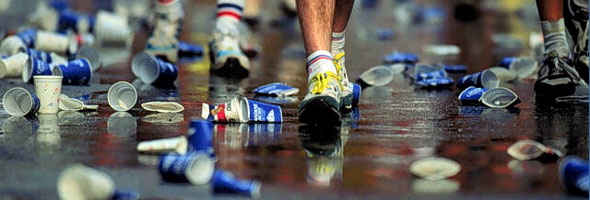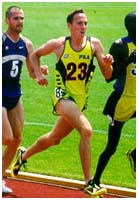Water is one of the main needs for the bodys’ life-supporting functions. Water is its number one nutrient and body functioning is compromised by loss of too much water.
Sweat is the obvious manner in which the body loses water, while exhaling also leads to loss of via water vapor. During physical exercise, both routes have a purpose, and dehydration becomes a problem. Fatigue is the first symptom of dehydration: (the often-stated 1 -2% of loss causing a loss of performance is not supported by any research evidence. Actually, most marathon winners finish with more than 1-2% of loss). A 7% loss can lead to a likely collapse.
Fluid losses via Sweat
Working muscles produce heat as a by-product of ATP breakdown. The body cools itself via sweating. Each liter of sweat dissipates about 600 kcalories of heat, preventing a rise in body temperature of almost 10° C. The body routes its blood supply through the capillaries just under the skin, and the skin secretes sweat to evaporate and cool the skin and the underlying blood. The deeper body chambers are cooled when the blood flows back.
In humid weather, sweat doesn’t evaporate well because the surrounding air is already laden with water. Body heat builds up and triggers maximum sweating, but without sweat evaporation due to the high humidity, and therefore little cooling takes place. In such conditions, active people must take precautions to prevent heat stroke. drinking does not prevent heatstroke: If one is running fast in very hot conditions or very humid conditions (such as in a hot cross-country race), there is a high risk of heatstroke even though there is no dehydration. There are more cases of heatstroke in shorter faster races in hot conditions than in marathons. This is because heat production in the marathon is relatively low because of the (relatively) low running speed (compared to cross-country or 10k, for example), rest in the shade when tired, and wear lightweight clothing that allows evaporation. [Hence the danger of rubber or heavy suits that ‘supposedly promote weight loss during physical activity – they promote profuse sweating, prevent sweat evaporation, and invite heat stroke]
If you ever experience any of the symptoms of heat stroke listed under Explanations at the bottom of the article, stop your activity, sip fluids, seek shade, and ask for help. If necessary, cooling with fans and ice may be necessary to bring body temperature down. Since heat stroke is dangerous and can be fatal, symptoms of heat stroke demand attention.
Athletes preparing for competition are often advised to drink extra fluids in the days immediately beforehand, especially if they are still training. The extra water is not stored in the body, but drinking extra water ensures maximum hydration at the start of an event.
To prepare for fluid losses, a person must hydrate before activity. To replace fluid losses, the person must rehydrate during and after activity. Even then, in hot weather, the GI tract may not be able to absorb enough to keep up with sweat losses, and some degree of dehydration may be inevitable.
Athletes preparing for competition are often advised to drink extra fluids in the days immediately beforehand, especially if they are still training. The extra water is not stored in the body, but drinking extra water ensures maximum hydration at the start of an event.
Some coaches and athletes withhold water during practice because they mistakenly believe the body adapts to use less water and that this will somehow be beneficial.
Full hydration is imperative for every athlete both in training and in competition. The athlete who arrives at an event even slightly dehydrated, arrives with a disadvantage. Drinking extra water does no harm and may be protective.
What is the best fluid for an exercising body? For non-competitive, everyday active people, plain cool water is recommended, especially in warm weather, for two reasons: it rapidly leaves the digestive tract to enter the tissues where it is needed, and it cools the body from the inside out. For endurance athletes, other purposes for replenishing water lost through sweating and providing a source of carbohydrate to supplement the body’s limited glycogen stores. Carbohydrate depletion brings on fatigue in the athlete, but as already mentioned, fluid loss and the accompanying build-up of body heat can be life-threatening. Thus the first priority for endurance athletes should be to replace fluids. Many good-tasting drinks are marketed for active people.
Electrolyte losses and replacement
When a person sweats, small amounts of electrolytes – the electrically charged minerals sodium, potassium, chloride, and magnesium – are lost from the body along with water. Losses are greatest in beginners; training improves electrolyte retention.
To replenish lost electrolytes, a person ordinarily needs only to eat a regular diet that meets energy and nutrient needs. In extremely demanding endurance events lasting more than 3 hours, electrolyte replacements may be needed.
Getting your electrolyte replacement balance right depends on the individual and needs to be practiced in training and not on race day.
Explanations
Hyperthermia: an above-normal body temperature
Heat Stroke: the dangerous accumulation of body heat with accompanying loss of body fluid.
Symptoms of heat stroke
Headache
Nausea
Dizziness
Clumsiness
Stumbling
Excessive or insufficient sweating
Confusion or other mental changes
Hypothermia: a below-normal body temperature
See further articles on this subject under the Nutrition section
More articles on this subject in the future.
Time-to-Run aims to assist you with nutritional advise in order to make your running experiences more enjoyable and continually emphasizes that it is best to get the direct assistance from a nutritionist and/or dietician so that they are able to ascertain the difference, through testing, in your body fat percentage and lean muscle mass, thereby providing you with a totally individual dietary program.































“In extremely demanding endurance events lasting more than 3 hours, electrolyte replacements may be needed.”
“Electrolyte or salt tablets always cause water to flow out the tissues into the GI tract, they also increase potassium losses, irritate the stomach, and cause vomiting. Thus these tablets worsen dehydration and impair performance in several ways.”
Hi, these two statements seem to contradict one another, what is actually meant?
And from listening to Tim Noakes, he claims that his research has demonstrated that the body will withhold electrolyte losses (say, sodium) via sweat and urine if necessary, and hence sweating out “too much” electrolyte is not an issue. In other words, anyone on a normal diet will never need electrolyte replacement during an event, as the body is perfectly capable of maintaining (say) sodium levels. Do you agree with this assessment?
Thanks for this Roger, it is no doubt meant to read most electrolytes and salt tablets. Have made the edit accordingly to try bring clarity to the article. The idea is to get the balance right with the electrolytes on an individual basis.
If you would like for us to involve Doc Andrew Bosch in reply, please, let us know and we will further elaborate on the discussion?
From my point of view, each person is different and it is very difficult to throw a blanket across what a normal diet should be for each person therefore the needs of the individual vary during an event.
Sodium and electrolytes are seldom needed in an energy replacement drink, other than possibly during ultra-running. Even then, potassium would be contra-indicated as blood potassium levels actually increase during prolonged exercise. Neither does sodium help prevent cramps: There are plenty of laboratory and field trials that have shown that. Having said that, a VERY small amount of sodium could be included in a carbohydrate replacement drink as the carbohydrate is absorbed via a sodium dependant transporter, and thus the sodium could optimise that process. As one becomes fitter, the body conserves sodium in sweat, as suggested by Roger in one of the previous posts. Thus it is less likely that a deficiency can occur in the long term, especially since the daily intake of sodium is way higher than what is needed due to all the processed foods we ingest every day.